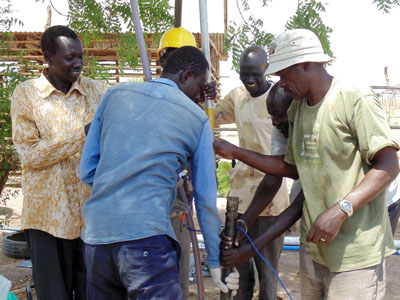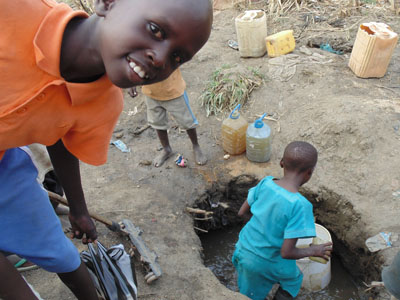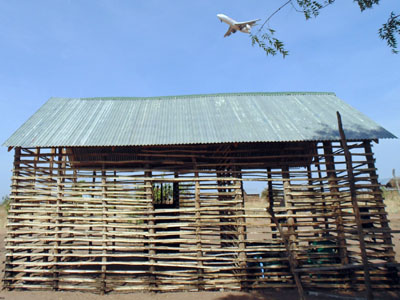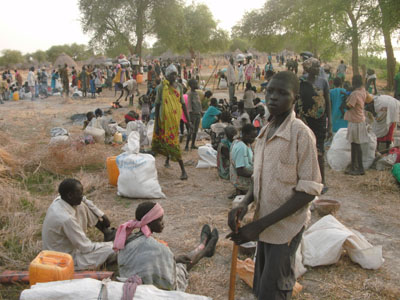A letter from Leisa Wagstaff serving in South Sudan
March 2016
Write to Leisa Wagstaff
Individuals: Give online to E200501 to Leisa Wagstaff’s sending and support
Congregations: Give to D504924 for Leisa Wagstaff’s sending and support
Churches are asked to send donations through your congregation’s normal receiving site (this is usually your presbytery).
During a first visit to a school the gathered assembly of staff, parents and church leaders showed me the well water available to the students. Their hand-dug well had dried up, which meant having to venture out further to supply buckets of drinking water for the children. Hearing the concern in my voice about the muddy-looking water, one teacher replied, “We know it is not good for our children’s health, but what else can we do? If we do not give them water, they will stay home and drink the water there, which is also unsafe. We cannot just allow our children to be the way they are—without opportunity.”
Exactly! What else could they do? What could I do? What could we do together?
Thankfully, I was able to share this need with Presbyterian mission co-worker Jim McGill, who was in the country working on long-term interventions to improve water and sanitation, a project partially funded through the PC(USA) Presbyterian Women’s Birthday Offering. He and his locally trained co-workers volunteered their time and expertise to start drilling a well with the assistance of the community. A School Water Management Committee was established by the PTA and the SMC (Sudanese Medical Council), and members are learning how to assure the fair distribution of this water. This committee will also be responsible for the maintenance of the well when it is finished. Partnership in action!
The teacher’s response to the water situation still rings in my mind. “We cannot just allow our children to be the way they are—without opportunity.”
Muddy water is just one of the countless obstacles both teachers and students in many schools face when they commit themselves to education. Volunteers from the community, possessing no more than a primary school education and a desire to share what they have, are the teachers. Salaries are unheard of for these dedicated teachers.
The children come on a rotating basis and sit on mats on packed dirt floors. Classes are combined so that no child is turned away. Crowdedness and lack of textbooks are just a few more things that these students and teachers at this school have to contend with. Another is the school’s sole chalkboard. It is carried between the two classes as needed and propped against the bamboo poles. When the rainy season comes the wind will blow the rain through the openings in the walls and the children, and everything else—including their one and only chalkboard—will get wet. That is a future reality that the school stakeholders will have to deal with; for now it is still the dry season. To top it all off, this school is located at the end of a runway. The noise from the aircraft that are constantly taking off and landing disrupts teaching.
Building the school itself can be quite challenging, for many schools serve internally displaced families. The majority of children have already experienced many giant challenges as they were forced to flee their communities by conflict. Now they are living in overcrowded tents and tiny makeshift structures without water, latrines, shops, and electricity. Often there are no trees to provide shade or break the force of the wind. Places for resettlement are few and lack the infrastructure to provide families with physical and emotional security as they try to start anew.
The resettled PCOSS (Presbyterian Church of South Sudan) Christians in this community met for worship in the open. Gradually they were able to start building with poles pounded into the ground and a few sheets of zinc. Having accomplished this, they ambitiously set their goals on another urgent matter—a school for their children and their neighbors’ children. The church structure served as the classroom until the wind blew away the zinc roofing. Not giving up, another structure was secured. Four hundred children started showing up, eager to learn their numbers and to proudly say that they are school-goers.
The PCOSS Education Department is committed to this school as well as many others like it. Through the PC(USA)’s South Sudan Education and Peacebuilding Project (SSEPP) we are empowering the community to do even more. We are helping parents to see ways in which they can contribute to the school’s success. It may be agreeing to send their children to school on a daily basis and give them time to do homework before assigning chores, sharing hard-earned food with the volunteer teachers, fetching the pupils’ drinking water from faraway watering holes, taking responsibility for certain portions of the school’s upkeep, planting school gardens, or finding ways to promote peace within their own communities.
SSEPP also advocates on the schools’ behalf with the government and NGOs, though this has been frustrating. We are told by the government, for example, that there is no money with which to print the required textbooks for the new syllabus that is being implemented in the country. Just trying to train teachers and get chalkboards and chalk into the classrooms can be disheartening—but we continue. We are motivated by the excitement of learners and PTAs, the SMC, and the commitment of Presbyterian World Mission. As that one teacher said, “What else can we do?”
As I recommit myself to being the best mission co-worker possible, I celebrate the life and homegoing of Ms. Leatta Weidenbach, who for decades was a medical missionary in Cameroon, Ethiopia, Zambia, Sudan and the former Zaire. By her example Leatta taught me how to be in community with those one is called to serve. She loved God’s people regardless of their particulars and always sought to touch their hearts. I am grateful that I had a chance to be mentored by Leatta, a true missionary whose positive impact in still felt to this day by the people she served.
We may not be able to do much about many aspects of the condition of schools, but we can work together to show these children the love of Christ Jesus and that they matter. That is something we all can do! Through the many ways in which you are partnering with the people of South Sudan and throughout the world, great things are being done that are positively changing the way people eat, think and live out their faith, and will be a testimony to all. Your prayer and financial support keep me and all of our mission co-workers on the field and greatly impact the vibrancy of all ministries of the PC(USA) and the PCOSS. Thank you!
In Service Together,
Leisa Wagstaff
Education Department
Presbyterian Church of South Sudan (PCOSS)
Central Equatoria State, South Sudan
leisawagstaff@gmail.com
![]() You may freely reuse and distribute this article in its entirety for non-commercial purposes in any medium. Please include author attribution, photography credits, and a link to the original article. This work is licensed under a Creative Commons Attribution-NonCommercial-NoDeratives 4.0 International License.
You may freely reuse and distribute this article in its entirety for non-commercial purposes in any medium. Please include author attribution, photography credits, and a link to the original article. This work is licensed under a Creative Commons Attribution-NonCommercial-NoDeratives 4.0 International License.



